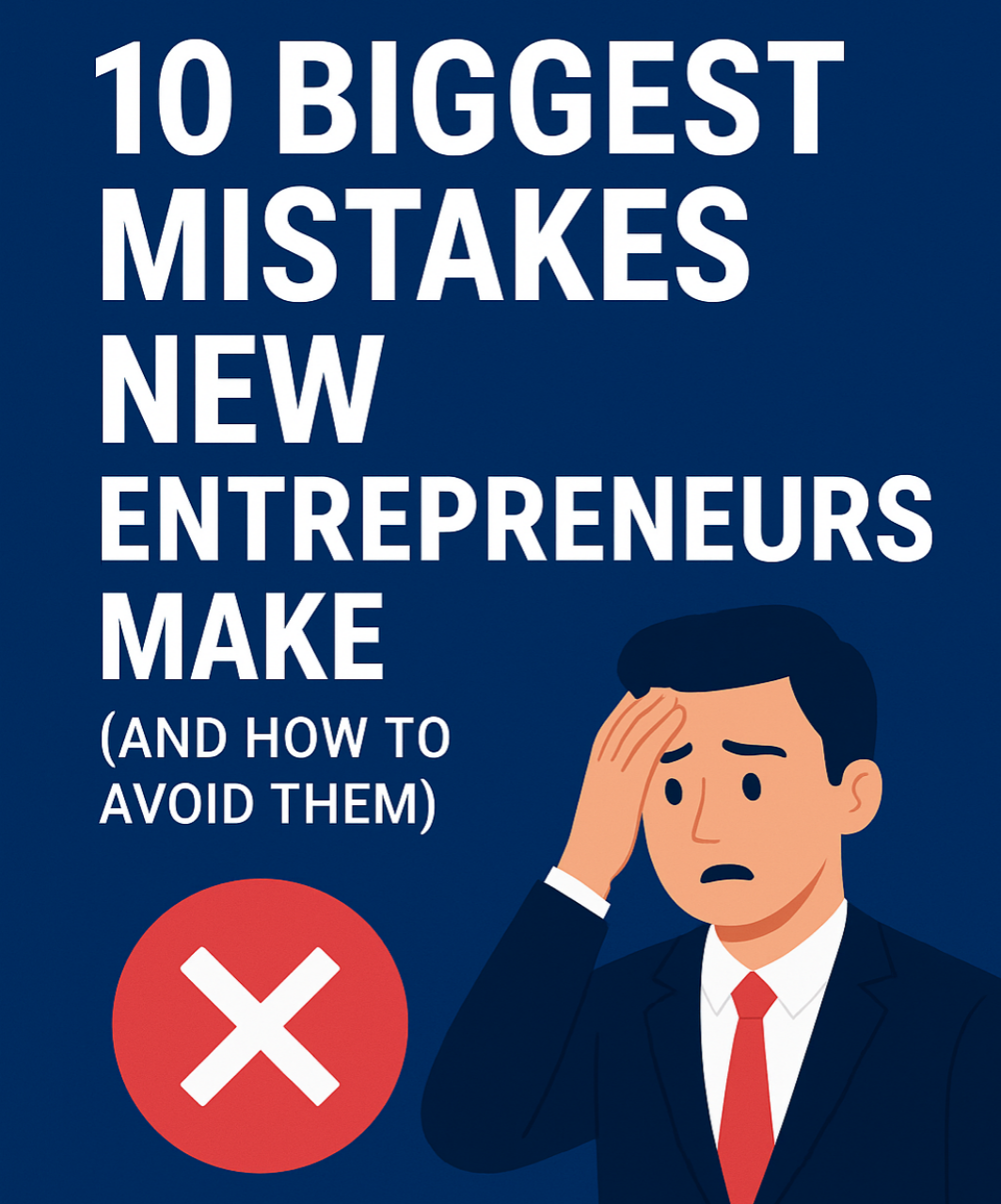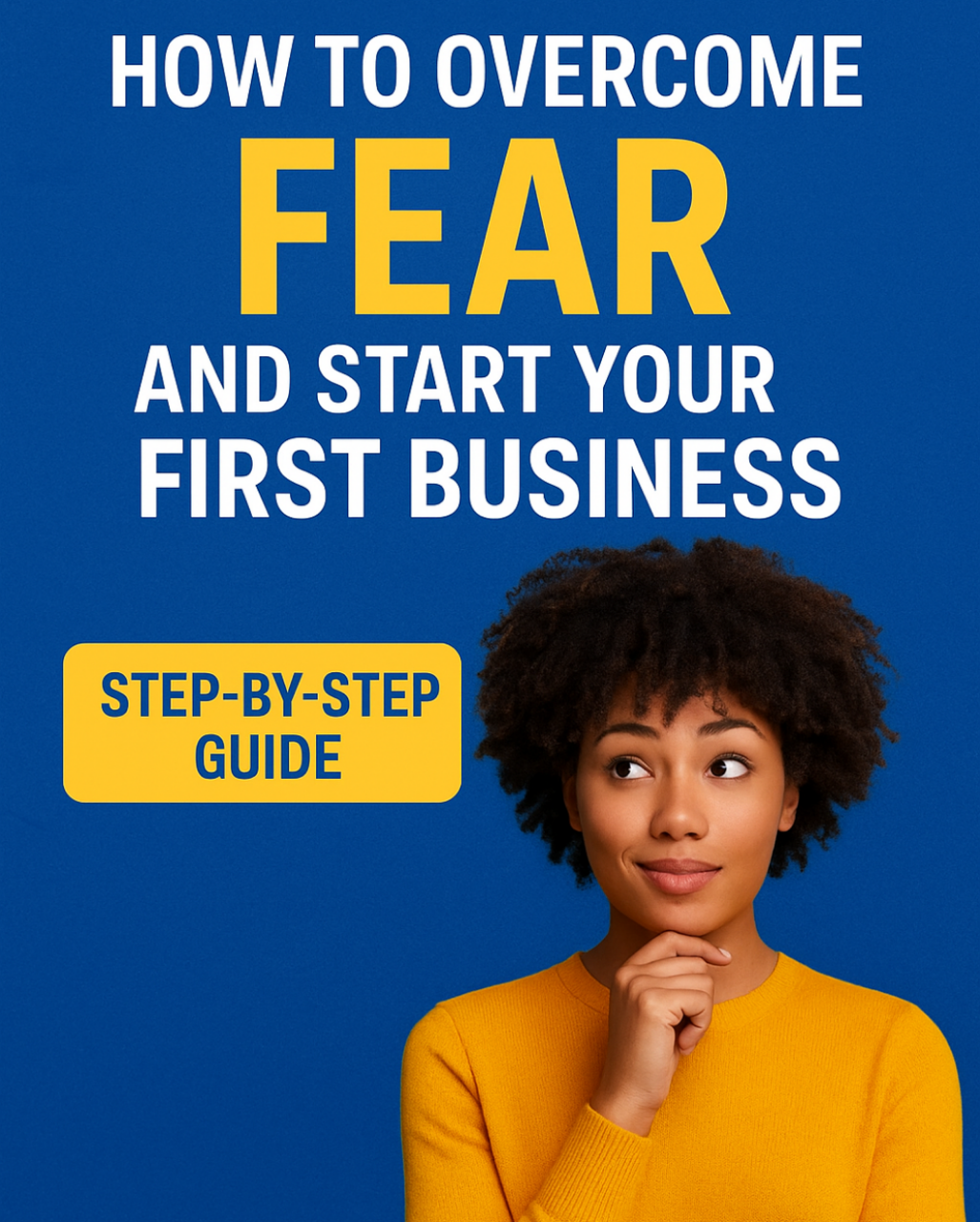Let’s be honest — starting your first business is exciting and scary at the same time.
You’ve got passion, drive, and maybe a notebook full of “million-dollar ideas.” But here’s the truth: enthusiasm alone doesn’t build a business. Understanding what not to do is just as important as knowing what to do.
As someone who’s spent over two decades mentoring new entrepreneurs, I’ve watched many bright minds fail — not because they lacked intelligence, but because they fell into predictable traps.
So today, I’m going to save you years of frustration by showing you the 10 biggest mistakes new entrepreneurs make, and more importantly — how to avoid them.
Grab a notebook, because this one will open your eyes. 👇

🚫 Mistake 1: Starting Without a Clear Problem to Solve
Most new entrepreneurs fall in love with their idea — not their customer’s problem.
They say things like, “I want to start a fashion brand,” or “I want to open a restaurant,” but when you ask why, there’s silence.
👉 Truth: People don’t pay for your idea. They pay for the solution your idea brings.
How to avoid it:
Before launching anything, ask yourself:
- What problem am I solving?
- Who has this problem badly enough to pay for a solution?
- Is my solution unique or faster, cheaper, or better than alternatives?
When you start with a problem instead of a passion alone, you’ll always have a market.
💸 Mistake 2: Ignoring Financial Planning
Many new entrepreneurs think, “I’ll just start small and figure it out later.”
But later often becomes never.
👉 Reality: Business is a money game. You must understand where your money is coming from and where it’s going.
How to avoid it:
- Create a simple budget — even if it’s on paper or Excel.
- Separate personal and business accounts.
- Know your startup costs and expected expenses.
- Always keep some emergency cash aside.
Money mismanagement kills more startups than bad ideas.
💡 Mistake 3: Trying to Do Everything Alone
When you start out, you feel like a superhero — accountant, marketer, designer, and CEO all in one. But soon, burnout hits.
👉 Reality: Even superheroes have teams.
How to avoid it:
- Start small, but delegate early — even if it’s just hiring a freelancer for design or social media.
- Learn collaboration instead of control.
- Build relationships with mentors and peers who can guide you.
A business is built by systems, not superheroes.
📉 Mistake 4: Skipping Market Research
Imagine you built a luxury ice cream shop in a neighborhood where people barely buy ice cream. That’s what happens when you skip market research.
👉 Truth: Guesswork is not strategy.
How to avoid it:
- Talk to your potential customers before building.
- Test your product idea on a small scale.
- Study competitors — what they do right and wrong.
- Use free tools like Google Trends, Reddit, or Facebook groups to learn what people want.
Research doesn’t kill creativity — it gives it direction.
🚀 Mistake 5: Wanting to Grow Too Fast
New entrepreneurs often dream of going viral overnight — but premature scaling can destroy your foundation.
👉 Example: Imagine building a 10-story house on a weak foundation — it will collapse.
How to avoid it:
- Grow based on demand, not desperation.
- Master one product, one market, and one channel first.
- Automate and systemize before expanding.
Slow, steady, and structured growth beats fast and fragile success every time.
🤝 Mistake 6: Ignoring Customer Experience
A business dies quietly when it stops caring about people.
👉 Reality: People don’t just buy products — they buy experiences.
How to avoid it:
- Be reachable — respond quickly to questions or complaints.
- Deliver more than promised.
- Ask for feedback and act on it.
- Treat every customer as your best marketer.
Your most powerful advertisement is a happy customer.
📣 Mistake 7: Poor Branding and Messaging
Many entrepreneurs underestimate the power of a strong brand. Your brand isn’t just your logo — it’s how people feel about your business.
👉 Example: Apple doesn’t sell phones — it sells lifestyle and simplicity.
How to avoid it:
- Choose a clear name, color, and message.
- Be consistent across your website and social media.
- Tell your story — why you started and who you serve.
A strong brand builds trust long before the sale.
🧭 Mistake 8: Not Tracking Performance (No KPIs)
If you don’t measure, you can’t improve.
👉 Truth: “What gets measured gets managed.”
How to avoid it:
- Track your key metrics — sales, website visits, repeat customers, cost per lead, etc.
- Use free tools like Google Analytics or Excel.
- Review your results weekly or monthly.
Data turns confusion into clarity.
🔄 Mistake 9: Being Afraid to Pivot
Many new entrepreneurs stick to a failing idea for too long because they’re emotionally attached.
👉 Reality: Smart entrepreneurs don’t fall in love with ideas — they fall in love with impact.
How to avoid it:
- Be open to feedback, even when it hurts.
- If people aren’t buying, listen — not argue.
- Pivot quickly when the data says so.
Remember: Netflix started by mailing DVDs before it became a streaming giant. Adapt or get left behind.
💪 Mistake 10: Quitting Too Early
This one hurts the most.
Many entrepreneurs quit just before things start working.
👉 Example: A miner digs for gold, gives up a few inches before hitting the vein.
How to avoid it:
- Expect failures — they’re part of the process.
- Celebrate small wins.
- Keep learning and improving.
- Remind yourself why you started.
Persistence turns dreamers into doers.
🧠 Final Thoughts
Building a successful business isn’t about avoiding failure — it’s about learning faster than others.
Every mistake you avoid gives you more energy, time, and capital to focus on what truly matters: solving problems, serving people, and building lasting impact.
So don’t rush. Don’t fear mistakes. Just learn strategically — and grow smart.
❓ FAQs — Common Questions New Entrepreneurs Ask
Q1. How much money do I need to start a business?
You don’t need millions. Start small. Focus on solving a problem profitably. Begin with what you have and reinvest profits as you grow.
Q2. What if my idea already exists?
That’s actually a good sign — it means there’s a market! Focus on offering something better, faster, or more personal.
Q3. How long before I start making profit?
Most small businesses take 6–18 months to become profitable. Your speed depends on your model, consistency, and cash flow management.
Q4. How can I find a mentor or coach?
Follow experienced entrepreneurs on social media, attend webinars, or join business communities like LBI Online Business School.
Q5. What if I fail?
Then you learn, improve, and try again. Every successful entrepreneur you admire has failed — many times. What matters is staying in the game.
See Also:


